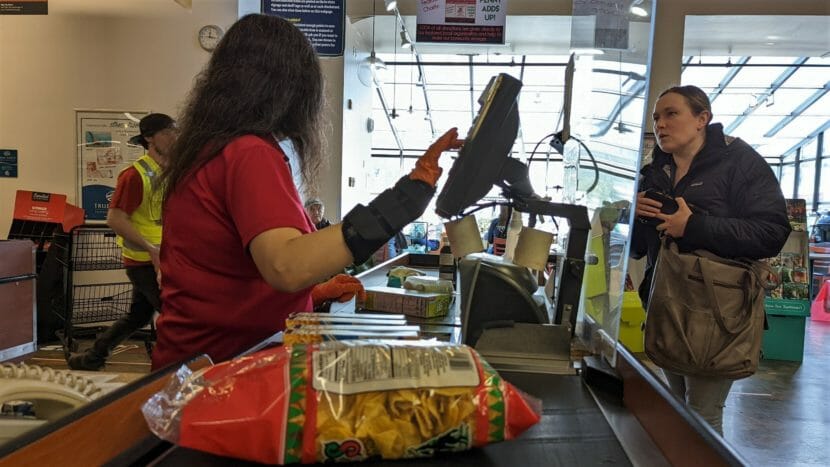
In Juneau, the city collects $6.2 million in taxes a year on the sale of groceries. Economists say that food taxes hurt the neediest people the most.
Exempting food from sales tax is a crowd pleaser. But many past assemblies have failed to make it happen, in part because the options for recouping the lost revenue are politically fraught.
Back in March, city Finance Director Jeff Rogers gave the Juneau Assembly his take on why exempting food from sales tax has repeatedly stalled out.
“When we look back and think about why it would appear that so many assemblies have aspired to do what this assembly aims to do and have never succeeded, I think choice overload is one of those problems,” Rogers said. “There’s just a lot of ways to skin that cat.”
For example, what is food? With past, unproductive debates in mind, the Assembly agreed to go with only foods covered by SNAP, the federally funded program that helps low-income households buy food. Grocers’ checkout systems are already set up to recognize these foods and exempt them from sales tax when someone buys them with SNAP benefits.
SNAP covers most basic groceries, but Assembly member Michelle Hale acknowledged the list isn’t ideal.
“… Things like hot chicken from the grocery store … pet food, diapers, you know, are not exempted. … I think they should be!” Hale said. “I think there’s a lot of those items that should be, and soda pop probably shouldn’t be a SNAP item, but it is.”
But she and the other Assembly members agreed to set those gripes aside, and go with the SNAP list for the sake of simplicity.
Now, the Assembly is wrestling with what to do about the loss of $6.2 million a food exemption would lead to for the city. Most Assembly members agree that they want to replace at least half of it — with something.
Deciding what that something is, is where it gets tough. In committee, the Assembly is considering repealing or tightening other existing sales tax breaks, each with its own fans.
For example, Mayor Beth Weldon suggested eliminating an exemption on sales by nonprofits. But Assembly member Barbara Wáahlaal Gíidaak Blake didn’t agree with that.
“I think the nonprofits that I’m considering, at least, just at the top of my head, provide a service to our community,” Wáahlaal Gíidaak said. “Social services, they provide education services for our youth. They’re helping our community and providing a service we might otherwise have to provide ourselves if they weren’t stepping up and helping our community.”
Deputy Mayor Maria Gladziszewski suggested restructuring a tax break for big-ticket items. Right now, sales tax doesn’t apply to the purchase price of a single good or service over $12,800. This means a buyer pays no more than $640 in sales tax on a single purchase, whether it’s for a used car or a luxury yacht.
Gladziszewski thinks that’s upside-down, that for big-ticket purchases, everything under a certain threshold should be tax-free. Rogers said he has no way to model the financial impact of that, and that it would be tricky to implement.
Mayor Weldon wasn’t a fan. She said the existing exemption helps businesses keep costs down that would otherwise be passed on to customers. As an example, she said Gladziszewski’s idea could make the sales tax due for buying a single dump truck go from $640 to more than $10,000.
The Assembly has not made any decisions on changing existing exemptions.
That leaves new taxes. Assembly members have floated the possibility of raising the sales tax rate — maybe just in the summer — or raising property taxes.
In 2019, Rogers ran some numbers to try to predict how a sales tax exemption on food plus a seasonal sales tax rate of 6% would affect local households, summer visitors, and the city’s bottom line. He estimated that local households would on average save about $143 a year, a summer visitor would pay about $1 extra, and the city would lose about half a million dollars in revenue.
In 2014, the Greater Juneau Chamber of Commerce supported exempting food and utilities, and to pay for it with an increase in the overall sales tax rate. It opposed a seasonal sales tax increase, saying it unfairly targets the visitor industry.
The chamber’s position has changed since then. Last week, it encouraged the Assembly pay for the food exemption without new taxes, in line with the results of a member survey in March.
Chamber Executive Director Craig Dahl said the city’s finances are in a much better position now, with a lot more cash on hand.
“When the chamber made recommendations several years ago, it was a kind of three-legged stool,” Dahl said. “There were several pieces to the recommendation and the Assembly only chose one of them. And so, those conditions don’t exist now the same way they did in 2014.”
While the Assembly can change the city’s property tax rate on its own, the city charter requires voters approve changes to the sales tax rate. To get a sales tax question on the October ballot, the Assembly must pass an ordinance by Aug. 4.



